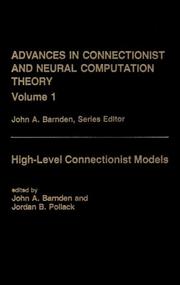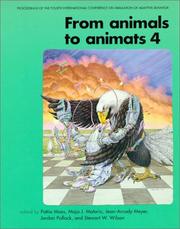| Listing 1 - 5 of 5 |
Sort by
|

ISBN: 0893916870 9780893916879 Year: 1991 Volume: v. 1 Publisher: Norwood, N.J. Ablex
Abstract | Keywords | Export | Availability | Bookmark
 Loading...
Loading...Choose an application
- Reference Manager
- EndNote
- RefWorks (Direct export to RefWorks)
Book
Year: 2004 Publisher: Cambridge The MIT Press
Abstract | Keywords | Export | Availability | Bookmark
 Loading...
Loading...Choose an application
- Reference Manager
- EndNote
- RefWorks (Direct export to RefWorks)
Artificial Life is an interdisciplinary effort to investigate the fundamental properties of living systems through the simulation and synthesis of life-like processes. The young field brings a powerful set of tools to the study of how high-level behavior can arise in systems governed by simple rules of interaction. Some of the fundamental questions include:What are the principles of evolution, learning, and growth that can be understood well enough to simulate as an information process?Can robots be built faster and more cheaply by mimicking biology than by the product design process used for automobiles and airplanes?How can we unify theories from dynamical systems, game theory, evolution, computing, geophysics, and cognition?The field has contributed fundamentally to our understanding of life itself through computer models, and has led to novel solutions to complex real-world problems across high technology and human society. This elite biennial meeting has grown from a small workshop in Santa Fe to a major international conference. This ninth volume of the proceedings of the international A-life conference reflects the growing quality and impact of this interdisciplinary scientific community.
Biological systems --- Computer simulation --- Artificial intelligence --- Robotics
Book
Year: 2004 Publisher: Cambridge The MIT Press
Abstract | Keywords | Export | Availability | Bookmark
 Loading...
Loading...Choose an application
- Reference Manager
- EndNote
- RefWorks (Direct export to RefWorks)
Artificial Life is an interdisciplinary effort to investigate the fundamental properties of living systems through the simulation and synthesis of life-like processes. The young field brings a powerful set of tools to the study of how high-level behavior can arise in systems governed by simple rules of interaction. Some of the fundamental questions include:What are the principles of evolution, learning, and growth that can be understood well enough to simulate as an information process?Can robots be built faster and more cheaply by mimicking biology than by the product design process used for automobiles and airplanes?How can we unify theories from dynamical systems, game theory, evolution, computing, geophysics, and cognition?The field has contributed fundamentally to our understanding of life itself through computer models, and has led to novel solutions to complex real-world problems across high technology and human society. This elite biennial meeting has grown from a small workshop in Santa Fe to a major international conference. This ninth volume of the proceedings of the international A-life conference reflects the growing quality and impact of this interdisciplinary scientific community.
Biological systems --- Computer simulation --- Artificial intelligence --- Robotics
Book
Year: 2004 Publisher: Cambridge The MIT Press
Abstract | Keywords | Export | Availability | Bookmark
 Loading...
Loading...Choose an application
- Reference Manager
- EndNote
- RefWorks (Direct export to RefWorks)
Artificial Life is an interdisciplinary effort to investigate the fundamental properties of living systems through the simulation and synthesis of life-like processes. The young field brings a powerful set of tools to the study of how high-level behavior can arise in systems governed by simple rules of interaction. Some of the fundamental questions include:What are the principles of evolution, learning, and growth that can be understood well enough to simulate as an information process?Can robots be built faster and more cheaply by mimicking biology than by the product design process used for automobiles and airplanes?How can we unify theories from dynamical systems, game theory, evolution, computing, geophysics, and cognition?The field has contributed fundamentally to our understanding of life itself through computer models, and has led to novel solutions to complex real-world problems across high technology and human society. This elite biennial meeting has grown from a small workshop in Santa Fe to a major international conference. This ninth volume of the proceedings of the international A-life conference reflects the growing quality and impact of this interdisciplinary scientific community.
Biological systems --- Artificial intelligence --- Robotics --- Computer simulation

ISBN: 0262631784 9780262291316 9780262631785 0262291312 0585136068 Year: 1996 Publisher: Cambridge (MA) ; London : M.I.T. Press,
Abstract | Keywords | Export | Availability | Bookmark
 Loading...
Loading...Choose an application
- Reference Manager
- EndNote
- RefWorks (Direct export to RefWorks)
The Animals to Animats Conference brings together researchers from ethology, psychology, ecology, artificial intelligence, artificial life, robotics, engineering, and related fields to further understanding of the behaviors and underlying mechanisms that allow natural and synthetic agents (animats) to adapt and survive in uncertain environments. The work presented focuses on well-defined models--robotic, computer-simulation, and mathematical--that help to characterize and compare various organizational principles or architectures underlying adaptive behavior in both natural animals and animats.
Animal behavior --- Animals --- Artificial intelligence --- Robotics --- Simulation methods --- Congresses. --- Adaptation --- Animals, Habits and behavior of --- Behavior, Animal --- Ethology --- Animal psychology --- Zoology --- Ethologists --- Psychology, Comparative --- Behavior --- COMPUTER SCIENCE/Artificial Intelligence
| Listing 1 - 5 of 5 |
Sort by
|

 Search
Search Feedback
Feedback About UniCat
About UniCat  Help
Help News
News